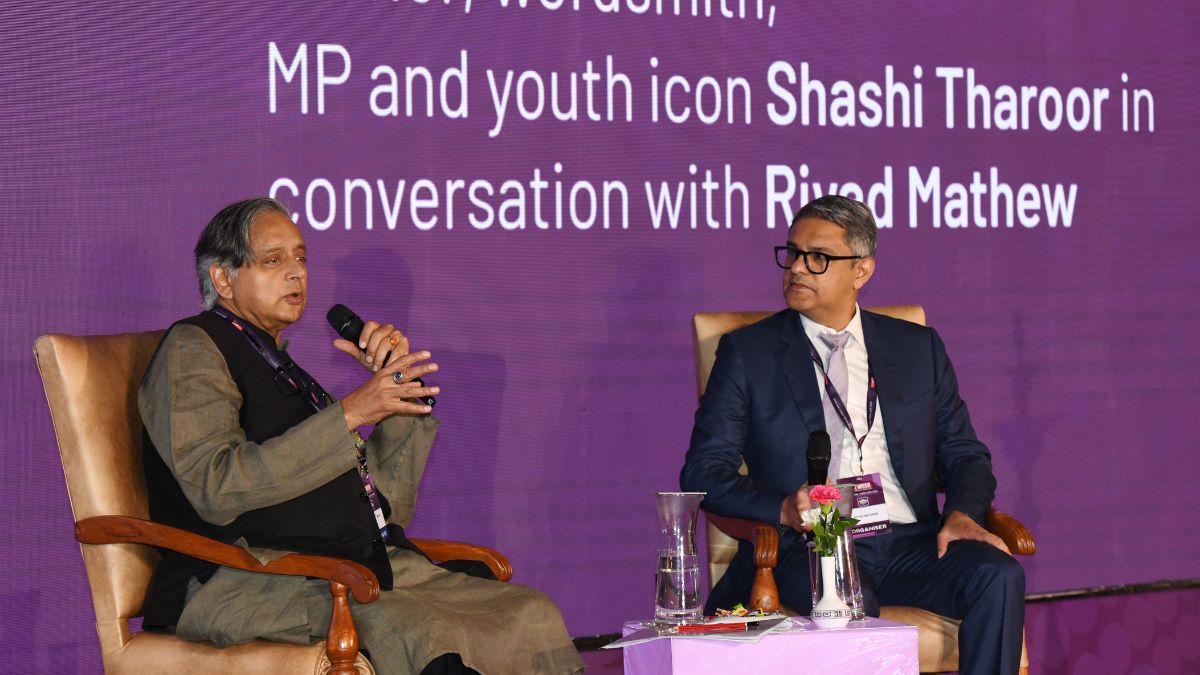THE WEEK’s Education Conclave: Shashi Tharoor says stable careers are over. What does it mean for India's Gen Z?
 Congress MP and former Union Minister Shashi Tharoor in conversation with Riyad Mathew, Chief Associate Editor and Director, THE WEEK, during THE WEEK’s Education Conclave in New Delhi | Sanjay Ahlawat
Congress MP and former Union Minister Shashi Tharoor in conversation with Riyad Mathew, Chief Associate Editor and Director, THE WEEK, during THE WEEK’s Education Conclave in New Delhi | Sanjay Ahlawat
Congress MP and former Union Minister Shashi Tharoor, speaking at THE WEEK’s Education Conclave in New Delhi, delivered a sharp critique of India’s education and employment ecosystem, while urging a broader mindset shift to empower Gen Z. The discussion, moderated by Riyad Mathew, Chief Associate Editor and Director, THE WEEK, traversed issues ranging from parental pressures on career choices to the lingering problem of brain drain and the role of English in shaping aspirations.
Stable careers are a thing of the past
Tharoor opened the conversation by reflecting on how societal and parental expectations once rigidly dictated career paths in India. “There was a time when parents were deeply reluctant to allow their children to deviate from the conventional paths of engineering, medicine, or the civil services,” he recalled. “When I chose to study the arts, my teacher even called up my parents to ask why. But my father respected my choice.”
Today’s Gen Z, however, is rewriting the rules. “The whole notion of job security has changed drastically,” Tharoor observed. “Kids now are self-employed, into data marketing, making reels, connecting companies. Stable careers, as we once understood them, are a thing of the past. They are more entrepreneurial and far less tied to the idea of a single employer for life.”
Careers with a cause
Tharoor stressed that a career must ultimately be rooted in purpose. “The real satisfaction comes when you create meaningful change,” he said. “At night, when you put your head to the pillow, you should feel you have done something that makes the world better.”
Drawing on his own career, Tharoor contrasted his stints at the United Nations and as the MP for Thiruvananthapuram. “At the UN, I worked directly with refugees and could see the impact of my work. In Thiruvananthapuram, it’s different. When I came in 2009, the bypass project connecting Tamil Nadu had been stuck for 40 years. We had to chase every department to get it moving. This was the pre-Gadkari era; you had to chase the government for everything,” he said, highlighting how governance often requires long-term perseverance.
Brain drain: hope and hurdles
On the perennial issue of brain drain, Tharoor acknowledged that India continues to lose bright talent overseas. “Entire graduating classes from IITs were once heading straight to the US,” he said. “But I also see hope. When I was Education Minister, I met a Muslim student from IIT Indore who turned down prestigious global scholarships in astrophysics to stay back in India and work with his professor. There are many such examples now. Young professionals are increasingly willing to return or stay, but we still lack enough job opportunities to match their ambitions.”
He also pointed to non-economic factors driving migration. “We cannot ignore the social environment. Incidents of moral policing, especially against young women and men in cities like Bengaluru, push many to seek the freedoms they believe they will find abroad,” Tharoor warned.
Moving away from exam obsession
Another key reform Tharoor advocated was reducing the overemphasis on examinations in universities. “Exams are not the only measure of knowledge,” he argued. “We must teach children how to think, not just what to think. Our students should be encouraged to question, debate and innovate.”
He also called for progressive reforms in student life, particularly in hostel rules that often impose stricter curfews on girls. “We need to build campuses where young people—especially women—feel trusted and equal,” he said.
English and Hinglish: embracing linguistic realities
Tharoor, an acclaimed author and orator, was categorical on the English language debate. “English is everybody’s second language in India, and in an increasingly globalised world, it is indispensable for communication,” he said.
He added that the language itself is evolving with a generational twist. “Gen Z has even created a hybrid—Hinglish—that reflects how language adapts to culture. We should celebrate this, not resist it. It’s an instrument of opportunity and connection, not a colonial vestige.”
A call for holistic reform
Closing the session, Tharoor argued that India’s education system must focus on cultivating curiosity, creativity, and confidence rather than producing exam-takers. “We are living in a world where AI and automation will transform jobs. If we keep teaching our kids by rote, we will leave them unprepared for the future,” he said.
Tharoor’s message was clear: India’s youth are already charting their own paths, but systemic reforms, better job creation, less restrictive rules, and an openness to evolving cultural and linguistic norms must accompany their ambition.
“The purpose of education is not just to get a job, but to prepare individuals for life,” Tharoor said.
The WEEK Education Conclave 2025, themed “World Class Student. Made in India”, will bring together leaders from academia, science, technology, and public policy to discuss building a globally competitive student ecosystem in India
India